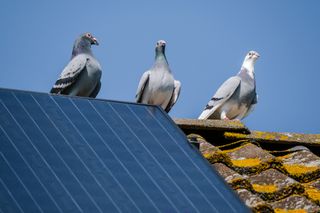Solar panel pigeon proofing — how to stop bird poo and nests damaging your array
Don't let bird droppings negatively impact the performance of your solar panels. Here's how to carry out solar panel pigeon proofing

So, you've decided the time is right to install solar PV panels to your roof but have you considered solar panel pigeon proofing?
You've had the roof checked to make sure that it's big enough, and strong enough, for thesolar PVpanels to be securely mounted, and you've been told that the panels have self-cleaning glass, so maintenance will be almost non-existent. And with the cost of electricity rising exponentially, what could be better than generating and using your own, free, green electricity?
But one consideration often overlooked is how to safeguard your new solar panels from birds — and more specifically their droppings.Read on to find out how to pigeon proof your array and make sure birds don't interfere with generating your home's electricity supply.
Solar panel pigeon proofing: How do birds cause damage to solar panels?
For pigeons and other birds, your solar panels may seem like the perfect spot to roost. The gap left by the installation hooks underneath the panels can provide, in their eyes, a suitable nesting area. But bird life, especially in marine environments, will leave deposits on the panels that may also be hard to clean.
Another issue arises when birds nest under solar panels. This could lead to accumulated debris such as twigs and leaves under your panels, potentially resulting in damage. The continuous scraping and movement of the nest against the panels might also lead to scratches or cracks on the panels' surface.

Does bird poo affect solar panel efficiency?
Bird droppings and other debris can indeed impact the performance of your solar panels. Any dust and dirt will stop the light reaching the solar cells and therefore lower the output generation of the systems.
If the light is completely blocked with thick deposits or leaf build up it could potentially knock out a complete panel or even the whole array. You can read more onhow do solar panels workin our guide.
How do you protect solar panels from birds?
Protecting your solar panels from birds and their droppings is essential.
The gap beneath solar panels is important to allow air movement. So blocking it off completely would be a bad thing and lead to the panels potentially overheating. It is therefore better to fit a robust mesh or netting system around the panels to stop any animals getting under them.
Materials such as镀锌鸟网, possibly with a UV stable PVC coating for extra protection, are preferable. These are weather-resistant and designed to last as long as the panels themselves.
Remember, it is always best to install these measures wheninstalling solar panels要在sure they fit properly and effectively serve their purpose.
How do you clean bird poo off a solar panel?

Even with preventative measures, some cleaning may be necessary to maintain optimum performance of your panels. Fortunately, many window cleaning services now also knowhow to clean solar panels.
These professionals use long-reach 'brooms' and hoses to clean the panels without damaging them. They can remove bird droppings and other debris that might have bypassed your deterrents, ensuring your panels remain as efficient as possible.
And if you're wondering 'how often should solar panels be cleaned?' then it's recommended you get them cleaned every 6 months to a year. This should help maintain their effectiveness and efficiency.
Get the Homebuilding & Renovating Newsletter
Bring your dream home to life with expert advice, how-to guides and design inspiration, direct to your inbox.
David is a renewables and ventilation installer, with over 35 years experience, and is a long-standing contributor to Homebuilding and Renovating magazine. He is a member of the Gas Safe Register, has a Masters degree in Sustainable Architecture, and is an authority in sustainable building and energy efficiency, with extensive knowledge in building fabrics, heat recovery ventilation, renewables, and also conventional heating systems. He is also a speaker at the Homebuilding & Renovating Show.
Passionate about healthy, efficient homes, he is director of Heat and Energy Ltd. He works with architects, builders, self builders and renovators, and designs and project manages the installation of ventilation and heating systems to achieve the most energy efficient and cost effective outcome for every home.
- Gabriella DysonAssistant Editor
Most Popular
Bring your dream home to life with expert advice, how-to guides and design inspiration, direct to your inbox.
Thank you for signing up to Homebuilding. You will receive a verification email shortly.
There was a problem. Please refresh the page and try again.
